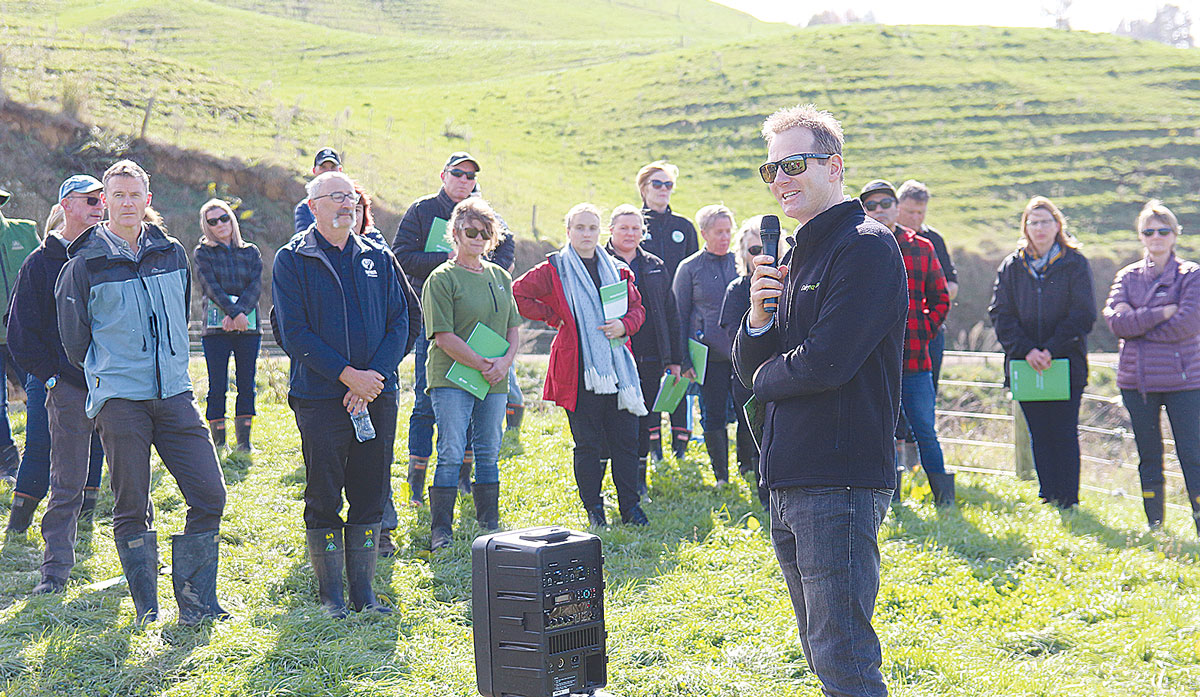Come and chat to the DairyNZ team
DairyNZ's team is looking forward to catching up with Southland and Otago dairy farmers at the Southern Field Days in Waimumu near Gore next month.
DairyNZ and NIWA have joined forces to help farms with wetland design and performance.
The new Wetland Practitioner Guide - Wetland Design and Performance Estimates was recently launched at a Waikato dairy farm which features as a case study.
DairyNZ's Waikato Dairy Environment Leaders joined the launch to learn more about the benefits of wetlands.
DairyNZ general manager for sustainable dairy, Dr David Burger, says as farmers increasingly look to protect and develop wetlands, advice is often sought on how to design wetlands to maximise their performance.
"With more farmers looking to reduce their environmental impact, there's growing interest in re-establishing and constructing new wetands," says Burger.
"We know wetlands can significantly reduce nutrient and sediment losses on farms. They also provide habitat for bird and fish, improve biodiversity and help create an attractive farm environment."
In 2015, with funding from the Waikato River Authority, Gray and Marilyn Baldwin developed a wetland on their 713 hectare, 850 cow dairy farm near Putaruru in South Waikato.
The Waikato River Authority, DairyNZ, NIWA, Opus, Hill Laboratories, and Waikato Regional Council worked together with the Baldwin Family Trust on the project. The aim was to improve knowledge of wetland design and performance and share this with Waikato farmers and the community.
Over 12,000 native plants were planted at the site by local community groups.
"Our farm is located in the Upper Karapiro catchment, which is one of the more sensitive ones in the Waikato region, as it drains into the Karapiro," says Gray Baldwin.
"We want to improve local waterways and we see the wetland as being important to the whole catchment. It is a taonga."
 |
|---|
|
DairyNZ's David Burger speaks to the group at the Baldwin Family Trust's wetland in South Waikato. |
The family are pleased to see biodiversity in the area improving and native birds flourishing.
With funding from DairyNZ, NIWA scientists monitored water flows and contaminant concentrations to assess the Baldwin's wetland performance.
Despite its relatively small size (around one percent of the farm catchment area), good design and extensive planting means the wetland removes around 60% of nitrogen, 70% of sediment and 20% of phosphorus from the water it receives.
The new guidelines highlight that as wetlands increase from one to five percent of a catchment area:
The guidance is the result of a four-year project between DairyNZ and NIWA, with input from many other organisations, including regional councils and Fish and Game NZ.
NIWA's principal scientist - aquatic pollution, Dr Chris Tanner says the guidelines are designed for practitioners, but also provide evidence for farmers and councils of wetland effectiveness in removing contaminants.
"The estimates are based on over 20 years of New Zealand study and international field-scale monitoring and modelling studies.
"Estimates were then refined, tested and endorsed by a technical advisory group supporting the project."
Burger says farmers who are interested in constructing wetlands can contact an environmental consultant to work through the new guidance. Farmers should also seek regional council advice on consents and any assistance available.
Coming in at a year-end total at 3088 units, a rise of around 10% over the 2806 total for 2024, the signs are that the New Zealand farm machinery industry is turning the corner after a difficult couple of years.
New Zealand's animal health industry has a new tool addressing a long-standing sustainability issue.
The Government has announced that ACC will be a sponsor of this year's FMG Young Farmer of the Year competition.
As veterinary student numbers grow to help address New Zealand's national workforce shortge, Massey University's School of Veterinary Science is inviting more veterinary practices to partner in training the next generation of vets.
South Island dairy farmers will soon be able to supply organic milk to Fonterra.
Norwood has announced the opening of a new Tasman dealership at Richmond near Nelson next month.
OPINION: There will be no cows at Europe's largest agricultural show in Paris this year for the first time ever…
OPINION: Canterbury grows most of the country's wheat, barley and oat crops. But persistently low wheat prices, coupled with a…